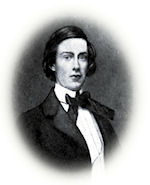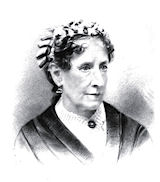Camp Causten, Aug. 22d, 1861.
My dear Cousin Lou:
What a pleasant thing it is to live, and how I do enjoy it here on the banks of the Potomac. I do not believe God ever made a more beautiful land than this. How I would fight for it if I believed it threatened by an unscrupulous foe! Cousin Lou, I used to think the “booty and beauty” allusion a sort of poor joke, too sorry even for ridicule, but I now see it as the cunning work of the far-sighted master who knew his people.
By-the-way do you know we are now encamped on the Kosciusko farm, and near by the house still stands where the patriot lived? I was walking in a cornfield today, and spied the silk drooping from one of the ears, dyed a deep red. I plucked it, and send it now to you in memory of Kosciusko, or if you like it better, in memory of Cousin Will. Bother! I was getting sentimental, when a gust of wind tore up the tent pins and blew out the candle. One has great experiences in camp. The other night I was softly slumbering, dreaming of Dolly Ann or of cutting a Secessionist’s throat, or something agreeable at any rate, when I heard a sound like that of mighty waters — I felt the waves washing over me — then followed a chilly sensation. I awoke. The stars were above me and by my side lay a sea of canvas — “in short,” as Mr. Micawber would say, my tent was blown down. Another night my tent was pitched on the side of a steep hill. I wrapped myself in my blanket, braced my feet against the tent-pole and fell asleep. In the night my knees relaxed, and no longer prevented by the prop, I slid quietly downward, awaking in the morning at a good night’s march from the point at which I first lay down to rest.
Much obliged for the information you send me regarding that youngest son of the Earl of Montrose, who came to America and graduated at Yale College. I always knew I was of noble degree, and have felt my blood preeminently Scotch since the first time I heard Aunt Caroline singing “Where, and oh where is my Highland Laddie gone?” I look too, admiringly upon the queenly Julia, and I say, “Nay, nay, but there’s no churl’s blood there.” In beatific vision the sisters five file past me; then comes long lanky Sylvester Vegetable Graham, leanest of men, with a bag of oatmeal, and I say to myself, “Verily my blood is very Scotch.”
Give my best love to that wee mite of a little lady who is to have the delightful honor of taking charge of my wooden leg when I return from the wars a garrulous one-legged old soldier. Imagine me, Cousin Lou, tripping it at my own wedding not on the light fantastic, but on timber toes. Now let us consider the matter, Cousin Lou. Shall the leg be a real timber one though, or shall a compromise be made with Nature, and one of the flexible Anglesea pattern be chosen?
Alas, alas! All day long we have heard guns firing in the distance. Some poor fellows must have fallen, though we get no intelligence of movements made. We are left out of the question. There is a great battle soon to take place, but I fear the 79th is too much crippled to make a great show. We numbered once a thousand gallant hearts — we number now 700 men capable for action; to such a pass we have been reduced by death and what is worse, by desertion. Officers have deserted, and the men have followed the base example. I have seen enough to convince me that this is no war for foreigners. It is our war, and let us cheerfully bear the burden ourselves. The South sends its best blood to fight for a phantom, but we, in the North, send our scum and filth to fight for a reality. It is not thus we are to gain the victory. I would have all our Northern youth not talk, but act — not deem their lives so precious as their honor. Have you read the names of those who resigned their commissions after the Battle of Manassas? The names of over 250 cowards. Life is sweet to all, but have they no trust in God that they fear the bitterness of death? Love to all friends in Enfield. I must say good-night.
Au-Revoir,
Will.
I did not serve as a private but in the capacity of Lieut. at Bull Run.




